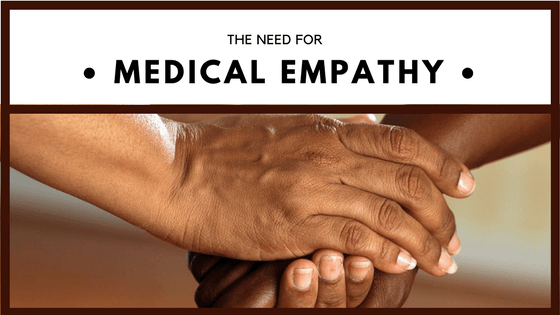A patient is more than a collection of well-arranged data points or a series of symptoms to be decoded. The rise of medical technology aides such as IBM’s Watson, which can sort through libraries of medical data in a matter of moments, has led some to speculate that a human doctor’s job may well be obsolete in a decade or three. But I believe that those who make these predictions have lost sight of one of the most significant aspects of a doctor’s job: medical empathy. The doctor-patient relationship is by definition a relationship; its success depends on a foundation of shared trust and communication. Think; how much trust would you place in a doctor who brushed off your questions, tossed out a diagnosis, and left before you fully understood your treatment plan? When a physician prioritizes dispassion and speedy problem-solving over empathetic care, the patient is left feeling unsatisfied with and – in some cases – untrusting of their advice.
And yet, the image of the dispassionate doctor dominates the medical field as a professional ideal. A study published by researchers at Jefferson Medical College in 2009 found that students’ expression of medical empathy significantly erodes over the course of their third year of training. Ironically enough, this time aligns with the beginning of their patient-care training, when a student’s empathetic skills are most needed. The study attributes this emotional atrophy to students’ socialization in cynical and dispassionate medical school cultures wherein empathy is viewed as unprofessional. However, other investigations have found this distanced manner to actually handicap rather than ensure physician success. In a 2004 study on effects of physician empathy on patient satisfaction, researchers found that patients who did not experience positive empathetic communication with their doctor were less likely to feel satisfied and/or comply with their doctor’s suggestions. Unempathetic doctors likewise found lower rates of positive patient outcomes than their empathetic colleagues. Despite the pervasive belief in the medical field that dispassion is more professional their empathy, a doctor’s decision to distance himself could prove detrimental to their success rate in the long term.
All this said, patients aren’t the only group under consideration. Those concerned for doctors might argue that a measure of dispassion is necessary in the doctor-patient relationship; after all, a doctor leaves himself open to emotional hurt when he connects with ailing patients. From this viewpoint, dispassion could be seen more as a tactic for self-preservation than a professional choice. However, researchers Bérangère Thirioux, François Birault, and Nematollah Jaafari might disagree. In a piece published in Front Psychol in 2016, the three argue that medical detachment ultimately “inhibits physicians from engaging emotionally with their patients and their own feelings,” leaving them unable to process their emotional responses in a healthy way. As such, dispassionate doctors are more at risk of suffering depression, anxiety, and burnout than their empathetic colleagues.
Those of us in the medical field have long rejected empathy as unprofessional – and yet, we now have evidence that empathetic communication is an integral part of facilitating both positive patient outcomes and physician wellness. As we increasingly turn towards telemedicine and distanced doctor-patient relationships, we need now more than ever to maintain empathy in our hospitals and private practices. Whether we mean to convey it or not, dispassion is a professional trait that we need to make every effort to stop teaching.


